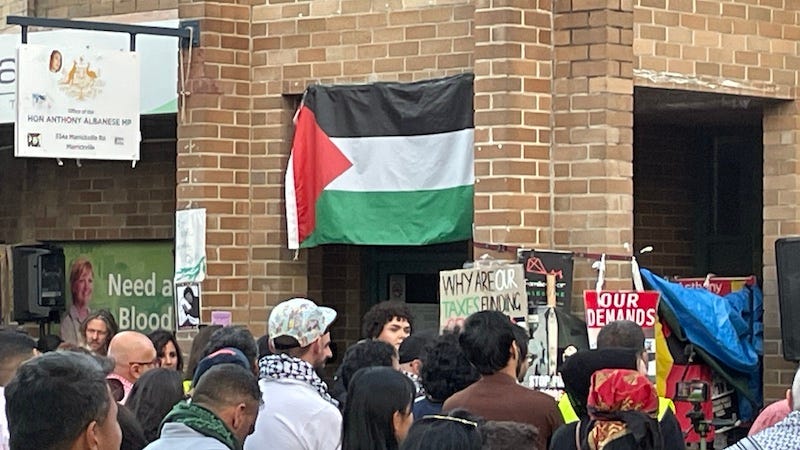The death of aid workers in Gaza sparks global outrage and a rethink of Australia’s diplomatic stance with Israel
The killing of aid workers by the IDF in Gaza has ignited widespread criticism, prompting debates on the Australian government’s weak response amidst calls for stronger action.
In the wake of the killing of Australian aid worker Zomi Frankcom and her colleagues by the Israel Defense Forces in Gaza, a storm of controversy and outrage has developed, not only for those directly involved but also the response—or lack of response—by the Australian government. The reports of this killing—which seems to be an execution based on the use of artificial intelligence and predictive technology—were marred by initial disinformation from Mossad attributing the deaths to Hamas, and the event has rapidly evolved into a focal point for broader discussions about Israel breaching international humanitarian law, war crimes, the ethics of warfare, and the complex web of geopolitical relationships that dictate international responses to such events.
The Australian government’s response, although more strident than most their commentary on Gaza over the past six months, has still been tepid and indecisive. Despite the gravitas of the situation, statements from Prime Minister Anthony Albanese and Foreign Minister Senator Penny Wong lacked the forcefulness for such a disaster, and played down the role of the Israel government. The killings in Gaza, which resulted in the deaths of seven aid workers from World Central Kitchen, should have been the clarion call for a stronger stance against the actions of Israel and the IDF, as well as lobbying for a ceasefire in Palestine and to end the war which has so far killed over 33,000 people in Gaza. Yet, the Australian leadership’s reaction reflects a cautious approach, influenced by the intricate dynamics of international politics and Australia’s strategic ties, especially with the United States, which maintains a complex and one-sided relationship with Israel.
While the world should have acted way before this specific event—the deaths of 33,000 Palestinians should have been the core reason for action—the deaths of the World Central Kitchen aid workers have ignited debates about the proportionality and justification of military actions performed by the IDF, the obligations under international humanitarian law, and the moral imperatives facing nations witnessing such conflicts. This incident constitutes a war crime—among many others committed by the IDF—and underlines the severity of the breach of laws designed to protect the most vulnerable, including those providing humanitarian aid in conflict zones.
The Australian government’s lack of meaningful actions have not occurred in a vacuum. International reactions have varied, with some leaders, like U.S. President Joe Biden and UK Prime Minister Rishi Sunak, expressing more direct frustrations with Israel’s actions—still with great limitations—and this divergence highlights the complexities of international diplomacy, where responses to conflicts are often tempered by strategic interests, historical relationships, and domestic political considerations.
The calls for tangible actions, such as recalling ambassadors and boycotting of Israeli products, are growing louder and reflects a growing impatience with this tepid diplomatic caution. Drawing parallels with the international isolation faced by the South African apartheid regime in the 1970s and 1980s, similar pressures could prompt a re-evaluation of policies and practices by Israel which are deemed in violation of international law and norms.
In this complex and evolving situation, it is clear that the Australian government faces a delicate balancing act. On one hand, there is a clear moral and legal imperative to condemn and seek accountability for actions that violate international humanitarian law. On the other, Australia must navigate its strategic relationships and the broader geopolitical landscape. But at what cost should this be, especially in the context of clear and obvious cases of apartheid, genocide and ethnic cleansing?
We should not only mourn the significant loss of lives in Gaza, but push the international community’s commitment to uphold the principles of justice, accountability, and human dignity in the face of conflict and geopolitical complexities. Australia is part of this international community and domestic pressure must continue to be placed upon the Albanese government to also uphold these principles.
Double and triple standards remain in vogue for political leaders
Despite Prime Minister Albanese’s historical advocacy for Palestinian rights and critical stance on Israeli policies—in 2002, his parliamentary comments openly and directly criticised the government of Israel for “creating a human rights and humanitarian crisis in Palestine”, for provoking the Al-Aqsa Intifada, funding Hamas, and berated Israel for allowing “fundamentalists to build illegal settlements on Palestinian land”—his commentary in 2024, once he achieved the power where he could actually make a difference, has lacked vigour and the condemnatory force many people would have expected, based on his past positions. The cowardice from Albanese, now in a position to effect change, reveals that his strong statements and actions in 2002 were superficial and shallow words, and have shown him up as a politician who is weak and callow.
Of course, this shift in Albanese’s tone highlights the complex pressures and responsibilities that come with leadership, especially on the international stage, where the balance between diplomatic relations and principled stances on human rights and international law must be carefully navigated. But how far can one’s principles be bent and distorted, and credibility shredded in such a way? Albanese’s past statements in Parliament, which emphasised the importance of adhering to international law and acknowledged the humanitarian crises faced by Palestinians, stand in contrast to his current commentary.
These criticisms should be extended beyond the Prime Minister and to other members of the Labor government, but this also highlights the divisions and the broader debate within Australian politics about the country’s stance on the Israeli–Palestinian conflict. The frustration among rank-and-file Labor members underscores the tension between party unity and individual members’ sympathies towards the Palestinian cause. This internal dynamic within the party mirrors the larger global debate on the conflict, where sympathies and political stances are often deeply personal and reflect a wide spectrum of views on justice, human rights, and national security.
The targeted IDF attack on World Central Kitchen has also been seen as a deliberate message to deter external aid to the Palestinian community in Gaza. This incident, referred to the British news presenter and commentator Richard Madeley as a “targeted execution”, represents a significant escalation in the tactics employed in the conflict, raising serious questions about the rules of engagement and the protection of humanitarian workers in conflict zones. The Australian government’s response to such incidents is not just about diplomatic relations with Israel but also about its commitment to upholding international humanitarian law and protecting civilians and aid workers in conflict zones. It’s condemnation of Israel and the IDF should have been far stronger.
There is so much more the Australian government can do
There are many potential avenues through which Australia could exert pressure and signal its condemnation of the Israel government’s actions, not only on the killing of one of its citizens performing humanitarian aid work, but of the 33,000 Palestinians in Gaza. Australia possesses a range of diplomatic and economic tools that could be deployed to express discontent and push for change, including recalling ambassadors, pausing military trade to Israel—52 Australian export licences were granted to Israel during 2023—and considering trade and cultural sanctions. These suggestions not only reflect potential policy actions but also highlight the expectations placed on Australian leaders to embody their historical stances on human rights and international law.
The local political ramifications of the government’s stance, particularly for Prime Minister Anthony Albanese, suggest a broader discontent among constituents. The silent vigil outside Albanese’s electoral office in Marrickville by the Palestine Action Group and his refusal to meet with them, illustrates a tension between political pragmatism and democratic responsiveness and a reflection of how the broader debate on Australia’s foreign policy and can have implications for domestic politics. The electoral implications for Albanese in his historically safe seat of Grayndler, underscore the political cost of perceived inaction or inadequate response to international human rights concerns.
The potential for electoral backlash in Albanese’s constituency, based on shifting public sentiment on the Israeli–Palestinian conflict, indicates a broader trend of increasing political accountability. While Albanese won the seat of Grayndler at the 2022 federal election by a margin of 67–33 per cent in two party preferred voting, previous election results—54–46 per cent at the 2010 federal election—have shown that with the right candidate and with the right campaign, the Australian Greens do have the potential to unseat Albanese at the next election. The unique dynamics of the Grayndler electorate—which shares state boundaries with the NSW state seat of Newtown, held by the NSW Greens—reveal a heightened sensitivity to issues of human rights and justice, and this presents a potential vulnerability for Albanese.
While there might be a political cost for the Prime Minister at a local level, Australia’s response to the destruction of Gaza and the broader Israeli–Palestinian conflict reveals the complex interplay between international diplomacy, domestic politics, and the moral imperatives of human rights and justice. As Australia manages its role on the global stage, the actions it chooses to take—or not take—will not only impact its international relations but also reflect its values and priorities to its own citizens and the electorate. The call for a more assertive stance on the Israeli–Palestinian conflict is not only about foreign policy and geopolitics, but about the very identity and moral compass of the Australian nation.










